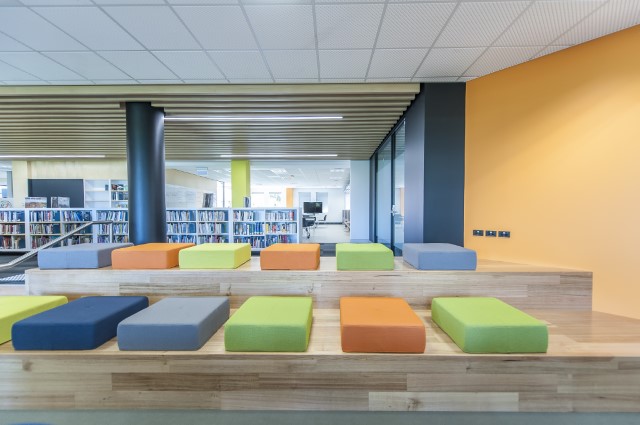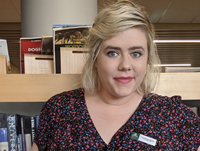Issue 116
Term 1 2021
School library spotlight: Trinity Grammar School, Sydney
SCIS speaks to Courtney Nolan, Library Services Manager, and Stefanie Gaspari, Director of Library Services, Trinity Grammar School, about what is happening in their school library.

Trinity Grammar School library
What is your job title, and what does your role entail?
Courtney: Library Services Manager for Trinity Grammar School, Sydney. In my role I take on many of the responsibilities that come with managing the administrative side of our library services. I managed our team of library support staff, and do my best to ensure the smooth day-to-day running of the library. This means that my role is very broad – I can be managing our calendar, staff schedule, social media engagement, and taking a reader’s advisory role with our students, staff and community.
Stef: Director of Library Services. I am responsible for leading a team of academic and support staff to deliver innovative library services and promote a positive reading culture at Trinity Grammar School, Sydney. The role has strategic oversight for three libraries – the Arthur Holt Library at our Senior School, the Junior School Library and the Preparatory School Library. Having Courtney to manage the administrative side of our libraries provides me the opportunity to focus on the design of collaborative and transdisciplinary real-world teaching and learning experiences, and supporting students and staff in the research process.
What is the most rewarding aspect of working in a school library, and why?
Courtney: Firstly, connecting with our school community through books, literature and reading. I love the joy that comes from engaging with students, staff and parents who are already passionate about literature and read for pleasure, and also the success of locating the perfect launch-pad book for a student who may not consider himself a ‘reader’. Secondly, I love being surrounded by colleagues who are passionate about lifelong learning. Some of the most fascinating conversations I have are with colleagues from different areas of the school about their work, passions and studies.
Stef: The students! They are a constant reminder of the wonder that exists in the world – the moments where you get to have a passionate debate about a book or are responsible for a ‘light-bulb’ learning experience are so rewarding. Also the books! Our learning spaces are aesthetically very modern in terms of furniture and technology, but our collection is the standout feature.
What do you see as the most important part of the library’s role in the school community?
Courtney: It is incredibly important that the library (staff, space as well as resources) is the first port of call when it comes to elevating the learning experience. It is also a wonderful central space to accommodate a range of student needs, from the social lunchtime groups and the quiet solo readers to the focused studiers. The library should be able to provide space and inspiration for all of these students and more.
Stef: There’s a quote that reads ‘A truly great library contains something in it to offend everyone’, by Jo Godwin – I read offend to mean ‘provoke’ – and I see this as a key part of the library’s role. To provoke curiosity, a love of reading, life-long learning. A school library should also be central to the life of the school – the physical and philosophical ‘heart of the school’.
It is incredibly important that the library (staff, space as well as resources) is the first port of call when it comes to elevating the
learning experience.
Are there any current issues or challenges facing your library? How are you working to overcome these?
Courtney: It is a nice problem to have, but demand is a challenge. We have a huge demand on our space and staff as teachers are very eager to book in their classes to work with our teaching and learning staff, use our variety of learning spaces and our physical resources. Our teaching and learning team can visit classrooms and we can prepare mobile collections for specific topics, but our bookings remain very tight. This has only been exacerbated by the current pandemic and the capacity restrictions we have in our space.
Stef: The only real challenge we currently face is the impact of the pandemic – restrictions on our capacity and not being able to run our regular events. We miss having more boys, their parents, staff and members of the extended school community in our space!
How do you promote reading and literacy in your school? Are there any challenges in doing so?
Courtney: We aim to ensure our students are library users as early as possible. We start their high school years with our involvement in Year 7 orientation. Not only do we introduce them to our space and services but we share a read-aloud, get them thinking about genre, gift them a new-release novel and provide them with a Library Bingo card that promises a departmental award on completion.
Once they have started at the high school, we have a new initiative where we are putting together a student-led middle school book club. It’s very non-traditional in form, and our aim for this club is to promote reading, and discussion of books and literature. We do not tell the students what to read, we only ask that they read widely and are prepared to discuss their reading activity. We find that if we have our students hooked into books and reading in the earlier years of high school, we don’t see as rapid a drop-off in their borrowing and reading in the senior years. This year, given that we are all online a whole lot more, we are relaunching a project that we undertook in 2018, where – inspired by the Australian Copyright Council – we asked our school community to tell us about the books that changed their lives. This year, we have asked our participants to film themselves (something we are all a little more adept at now!) speaking about their book, and submit this video to our ‘This book changed my life’ website: trinity.nsw.edu.au/booklife.
Stef: We are committed to driving a positive culture of reading in our school and fortunately this vision is supported by school leadership. Many of our school’s executive, including our headmaster, are active role models in reading for pleasure – have a look at our ‘This book changed my life’ website! Our reading promotion strategies are evidence based, we map what we do to Margaret Merga’s reading support strategies, and we are deliberate about the kinds of activities and initiatives we put our energy into to ensure the best possible outcomes for our students.
How do you promote an interest in STEAM areas in your school? Are there any challenges in doing so?
Courtney: We work in collaboration with various departments to promote STEAM areas. For example, we recently supported the Science staff with National Science Week 2020 at the Senior School – we coordinated an upcycled Deep Blue display and showcased the Year 7 students’ science week investigations in the Arthur Holt Library.
Stef: There are also dedicated STEAM spaces in our junior and preparatory schools. We support their endeavours and work in collaboration with STEAM staff in the design and delivery of PYP Units of Inquiry.
How do you encourage students to make use of the library?
Courtney: In so many ways: we have an incredibly up-to-date collection; we maintain an active social media presence on Twitter and Instagram; we maintain a popular digital collection of ebooks, audiobooks and online videos; we run incredible programs like our ‘This book changed my life’ initiative; we create a yearly Year 7 booklist and hold a Year 7 library orientation to excite the incoming students about our services; we encourage diverse reading through our Library Bingo cards; we give out library awards for top library patrons in front of the whole school; we have a roster of Duke of Edinburgh student volunteers which gives us student input and assistance in our projects; we run student led co-curricular groups such as Movie Club; we go all out on events such as National Simultaneous Storytime; we invite regular
guest speakers have presented for packed ‘Books@Breakfast’ events; our displays are engaging and change regularly; we have inviting soft furnishings and innovative furniture; we open from 7:30am to 6:00pm daily, including lunchtime and recess, and even open at reduced hours in the term break; we maintain up-to-date technology to encourage collaboration and innovation; and so much more!
Stef: Everything Courtney said! This is their space – we value student voice and find student ideas are often the most successful.
We find that if we have our students hooked into books and reading in the earlier years of high school, we don’t see as rapid a drop off in their borrowing and reading in the senior years.
What is your favourite thing about SCIS?
Courtney: Cataloguing service, engaging articles and prompt responses to enquiries.
Stef: It makes cataloguing so simple! The cover images are fantastic – I know you shouldn’t judge a book by its cover but many people do. Many of our students are visual learners and the cover images are helpful prompts to encourage borrowing. What would you like to see SCIS do more of?
Courtney: So impressed at everything you are already doing!
Stef: Keep up the great work!

